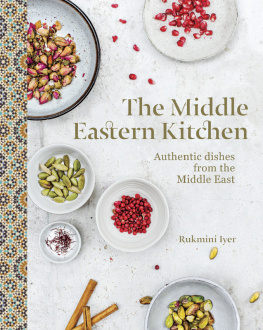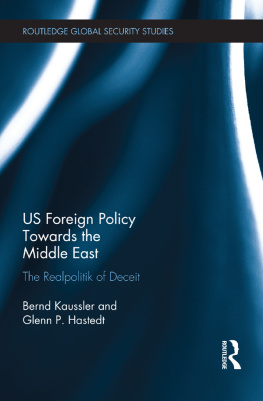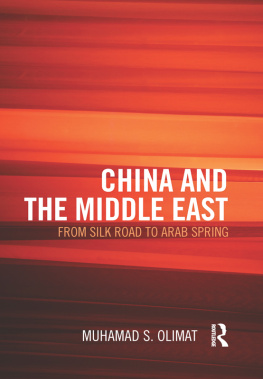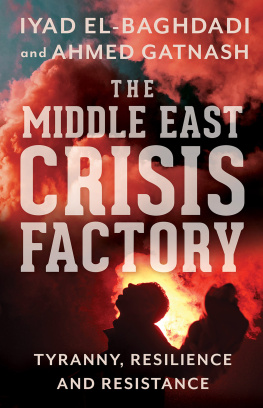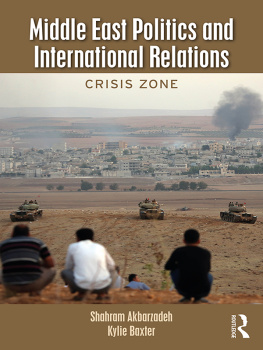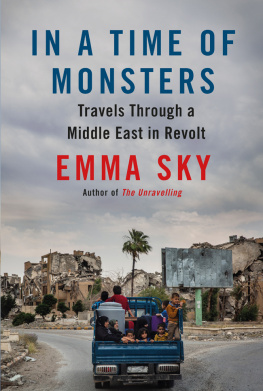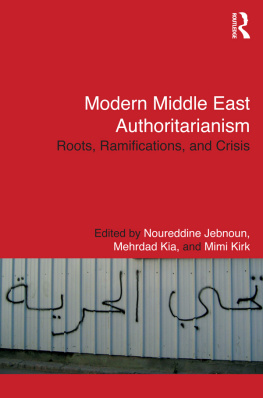FROM RESILIENCE TO REVOLUTION
Columbia Studies in Middle East Politics
COLUMBIA STUDIES IN MIDDLE EAST POLITICS
MARC LYNCH, SERIES EDITOR
Columbia Studies in Middle East Politics presents academically rigorous, well-written, relevant, and accessible books on the rapidly transforming politics of the Middle East for an interested academic and policy audience.
The Arab Uprisings Explained: New Contentious Politics in the Middle East, edited by Marc Lynch
Sectarian Politics in the Gulf: From the Iraq War to the Arab Uprisings, Frederic M. Wehrey
FROM RESILIENCE TO REVOLUTION
HOW FOREIGN INTERVENTIONS DESTABILIZE THE MIDDLE EAST
SEAN L. YOM
Columbia University Press
New York

Columbia University Press
Publishers Since 1893
New York Chichester, West Sussex
cup.columbia.edu
Copyright 2016 Columbia University Press
All rights reserved
Library of Congress Cataloging-in-Publication Data
Yom, Sean L.
From resilience to revolution : how foreign interventions destabilize the Middle East / Sean L. Yom.
pages cm. (Columbia studies in Middle East politics)
Includes bibliographical references and index.
ISBN 978-0-231-17564-7 (cloth : alk. paper) ISBN 978-0-23154027-8 (e-book)
1. AuthoritarianismMiddle EastHistory20th century. 2. Political stabilityMiddle EastHistory20th century. 3. Middle EastPolitics and government20th century. 4. KuwaitPolitics and government20th century. 5. IranPolitics and government20th century. 6. JordanPolitics and government20th century. 7. Middle EastForeign relationsWestern countries. 8. Western countriesForeign relationsMiddle East. I. Title.
DS62.8.Y66 2015
956.05dc23
2015013894
A Columbia University Press E-book.
CUP would be pleased to hear about your reading experience with this e-book at .
Cover Design: Jordan Wannemacher
Cover Image: ATTA KENARE/AFP/Getty Images
References to Web sites (URLs) were accurate at the time of writing. Neither the author nor Columbia University Press is responsible for URLs that may have expired or changed since the manuscript was prepared.
For Jessica,
my best Reason-for-Coming-Home
CONTENTS
PROPERLY TRANSLITERATING WORDS from Arabic and Persian into English is a task best left to linguists. To avoid confusion, in this book I have used the most popularized English transliterations for Arabic and Persian terms, including the preferred spelling for people, places, and ideas as they appear in the public record. I refrain from using most diacritics but retain apostrophizing for ayn and hamza (except for the initial hamza).
In addition, personal interviews are cited in notes when relevant. In several cases, those interviewed preferred to keep their identities confidentiala request that every ethical researcher should honor, especially when conducting research in authoritarian states.
AN UNSPARING NETWORK of friends and colleagues supported this project from start to finish. Grzegorz Ekiert, Steve Levitsky, and Melani Cammett were mentors who invested faith in my capacity for comparative research more than a decade ago. In the field, I was steered by special individuals with deep knowledge and warm hearts, among them Mohammad Al-Momany, Marwan Kardoosh, the Sharekh family, Yousif Al-Ebraheem, and Leila Ben Mcharek. I also thank the nearly a hundred individuals interviewed for this project; though only a portion appear in this book, all graciously gave me significant time and shrewd guidance as I navigated new countries. No less generous were the resources and grants offered by Harvard Universitys Graduate Society and Weather head Center for International Affairs, the Foreign Language and Area Studies program, the American Institute for Maghreb Studies, and the American Center for Oriental Research. In this books early stages, friends and colleagues lent expertise on squaring theory with evidence; among them were superstars Pete Moore, Tom Pepinsky, Wendy Pearlman, Michael Herb, Anne Mariel Zimmerman, and fellow participants at the Comparative Politics Workshop at Harvard.
Over the past few years, another network of gifted colleagues graciously reviewed my work and improved it immeasurably. Among them stand Larry Diamond, Kathryn Stoner, Steve Krasner, and Joel Beinin, all of whom I had the privilege of meeting as a postdoctoral fellow at the Center for Democracy, Development, and the Rule of Law at Stanford University. Since then, numerous scholars intervened to give me further constructive criticism. Among them were Tarek Masoud, Jillian Schwedler, Curtis Ryan, Ellen Lust, Greg Gause, Amaney Jamal, Jason Brownlee, Lina Khatib, David Abernethy, Philippe Schmitter, Saeid Golkar, Quinn Mecham, Mary Ann Ttreault, Lindsay Benstead, Michelle Penner Angrist, Stacey Yadav, Lisa Blaydes, David Patel, Matteo Legrenzi, Larry Rubin, Andr Bank, Thomas Richter, Oliver Schlumberger, Senem Aslan, Ceren Belge, Kristin Fabbe, Juliane Brach, Debra Shushan, Dafna Rand, Hillel Soifer, Jill Goldenpine, Anya Vodopyanov, and Peter Gran. In seminars, conferences, offices, workshops, hotel lobbies, pubs, airplanes, and coffee shops, they never hesitated to suggest new ideas, encourage my progress, and give professional advice. Finally, since 2010 Temple University has provided me not only a collegial department that welcomed me from the first day but also full sabbatical leave to finish this book just a few years into my appointment. These are the two best gifts any junior faculty member could receive.
Outside the craft of writing stands a special group of supporters. Katelyn Baker-Smith has been a superlative research assistant and sounding board, performing every task with astonishing efficiency and finding humor in the most brutal absurdities. My collaboration with Hicham Ben Abdallah and the unending hospitality of his family in Princeton and Rabat furnished vital perspective and intellectual respite during critical moments. Ana Hagstrand was inspirational and compassionate, generating faith during the roughest storms. I was also blessed to receive the editorial wisdom of Marc Lynch and Anne Routon. The former was patient and encouraging beyond all expectation, and the latter supportive and transparent beyond all belief. They are consummate professionals; the field of Middle East politics is fortunate to have them, and I was lucky to work with them. Michele Callaghans copy editing skills were a revelation. Last but not least, Whitney Johnson at Columbia University Press ushered these words through the production process, always reassuring me along the way. A first-time author could not have been treated better.
Above all, I finished this book in the arms of Jessica, who never ceased easing my burdens and never stopped reciprocating my love. Her strength has made everything possible.
THE ARAB SPRING raised hope that democracy would sweep over the largely authoritarian landscape of the Middle East and North Africa. As national transitions bogged down in violence and strife, however, optimistic forecasts of political freedom quickly gave way to more visceral concerns about stability and order. In many countries, the short-lived triumph of people power did not lead to the creation of resilient democracies that could bridge social divisions and rally popular support behind new leaders. Egypt, Libya, and Yemen have joined postwar Iraq and Afghanistan as examples in which authoritarian regimes were forced to surrender power in the twenty-first centurybut whose heirs have not established stable governments of any sort due to unending social resistance and popular unrest. Syria may well join their ranks.
Next page

